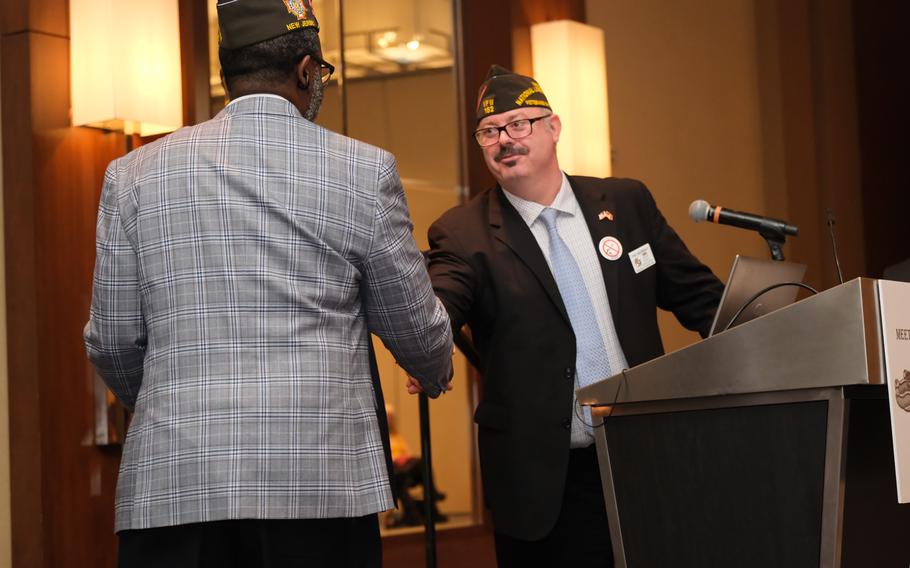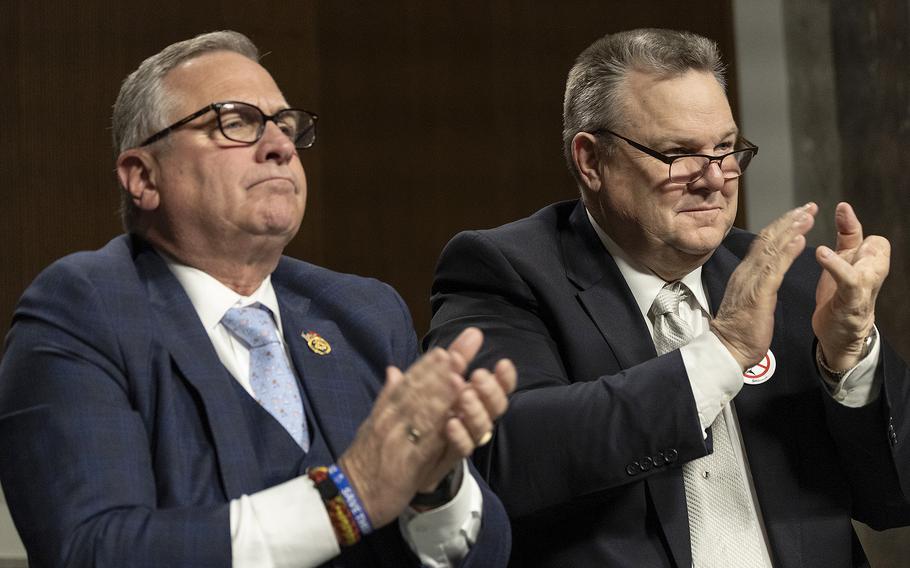
Patrick Murray, the VFW’s national legislative director, greets a fellow Veterans of Foreign Wars member Monday, March 4, 2024, at the group’s conference in Crystal City, Va. (Brittany Dymond/VFW)
WASHINGTON — A veteran’s need for help managing disability payments and other benefits from the Department of Veterans Affairs should not trigger the loss of his or her right to own a gun, said Monte Twilley, an Army veteran from Texas.
“The way I see it, a veteran may be appointed a fiduciary for a number of reasons, if they’re having trouble with finances. And veterans appreciate the VA’s help with that. But it’s a separate issue from someone’s mental competence to bear arms, and it needs to be scrutinized as such,” he said.
Twilley, a retired Army sergeant who served from 1977-1986 and had a second tour of duty from 1995-1996, is among veterans weighing in on legislation that would stop the VA from taking away the gun rights of veterans who require fiduciaries to handle their monthly disability checks, pensions and other VA benefits.
Under the current law, a determination by the VA that a veteran is unable to manage his or her finances also disqualifies that individual from possessing, owning or receiving firearms. The Veterans Second Amendment Protection Act is part of the $467.5 billion consolidated spending bill that passed the House on Wednesday and was adopted by the Senate late Friday, averting a government shutdown. The bill funds VA programs.
Under the new legislation, veterans will only lose their right to own or possess firearms after a court determines they are mentally incapacitated and pose a danger to themselves or others.
Rep. Mike Bost, R-Ill., who pushed for its inclusion in the overall spending bill, discussed the legislation at joint hearings Wednesday and Thursday of the Senate and House Veterans’ Affairs committees that focused on the legislative priorities and agendas of veterans organizations.
“Veterans who’ve needed a fiduciary have been wronged. [The VA has] automatically stripped veterans of their constitutional Second Amendment rights they fought to keep in place as members of our military,” said Bost, who is chairman of House Veterans’ Affairs Committee.

Rep. Mike Bost, R-Ill., chairman of House Veterans’ Affairs Committee, and Sen. Jon Tester, D-Mont., chairman of Senate Veterans’ Affairs Committee, applaud veterans in attendance March 6, 2024, at a joint committee hearing on Capitol Hill. (Joe Gromelski/Special to Stars and Stripes)
The Veterans of Foreign Wars, Disabled American Veterans and American Legion expressed support Friday for the legislation.
“We believe the Bost legislation would provide due process for those facing removal of their firearms,” said Patrick Murray, the VFW’s national legislative director. “A VA administrator should not be the person who removes the constitutional right to gun ownership. That is for a judge or magistrate to decide.”
Daniel Seehafer, national commander of the American Legion, said his organization sees the legislation as “seeking to undo a decades-old injustice for some veterans. As veterans, we swore to uphold the U.S. Constitution, which of course, includes the right to bear arms. We believe all veterans have the right to possess their choice of legal firearms, unless deemed unfit to do so by a court.”
The VA’s Veterans Benefits Administration, which disperses monthly benefit payments directly to veterans, is required now by federal law to submit the names of veterans to the FBI’s National Instant Background Check System as ineligible to own or possess firearms, upon the VA’s appointment of a fiduciary to manage their benefits.
The FBI’s background check system identifies for law enforcement agencies the names of individuals legally ineligible to own or possess firearms.
The VA declined to comment on the fiduciary program or the legislation.
Philip Van Guilder, an Army veteran, is director of community relations and a mental health advocate with Greenhouse Treatment Center in Texas, which provides care and services for veterans diagnosed with post-traumatic stress disorder and other mental health conditions related to military service.
Van Guilder said he understands the intent of the existing law, since an inability to manage finances could point to cognitive problems that prevent an individual from reasoning and thinking clearly.
“In those situations, it would not be safe to have a firearm close by,” said Van Guilder, a retired staff sergeant who served in Vietnam from 1965-1974.
Murray said the VFW has heard from veterans who have lost their rights to possess a firearm after the VA appointed a fiduciary to handle their disability checks and other benefits.
“One of our service officers in California who worked for VA’s fiduciary officer ran into these issues a lot because the veterans did not realize this was coming,” he said. “They were not aware of the law and were confused about why it was taking place.”
But the proposed legislation would stop the VA from sending “personally identifiable information” to the Department of Justice and FBI solely on the basis that the person requires a fiduciary to manage his or her benefits.
“Every time the VA asks if I own a gun, I say, ‘It’s none of your damn business.’ If you tell them you own firearms, they add it to your medical file,” said Billy Whyde, 71, a former Navy petty officer who served from 1969-1973 in and around Vietnam.
Whyde, who lives in Ohio, said he has received treatment at VA health facilities for vasculitis, cancer and other medical problems related to Agent Orange exposure.
He said he was familiar with the legislation to keep the VA from denying veterans the right to own and possess firearms when they are appointed fiduciaries. He is in full support of the measure to limit VA’s authority.
Whyde said he’s had his share of financial hardship but was never appointed a fiduciary.
“My case has been flagged before for financial hardship,” he said. “The VA overreaches.”